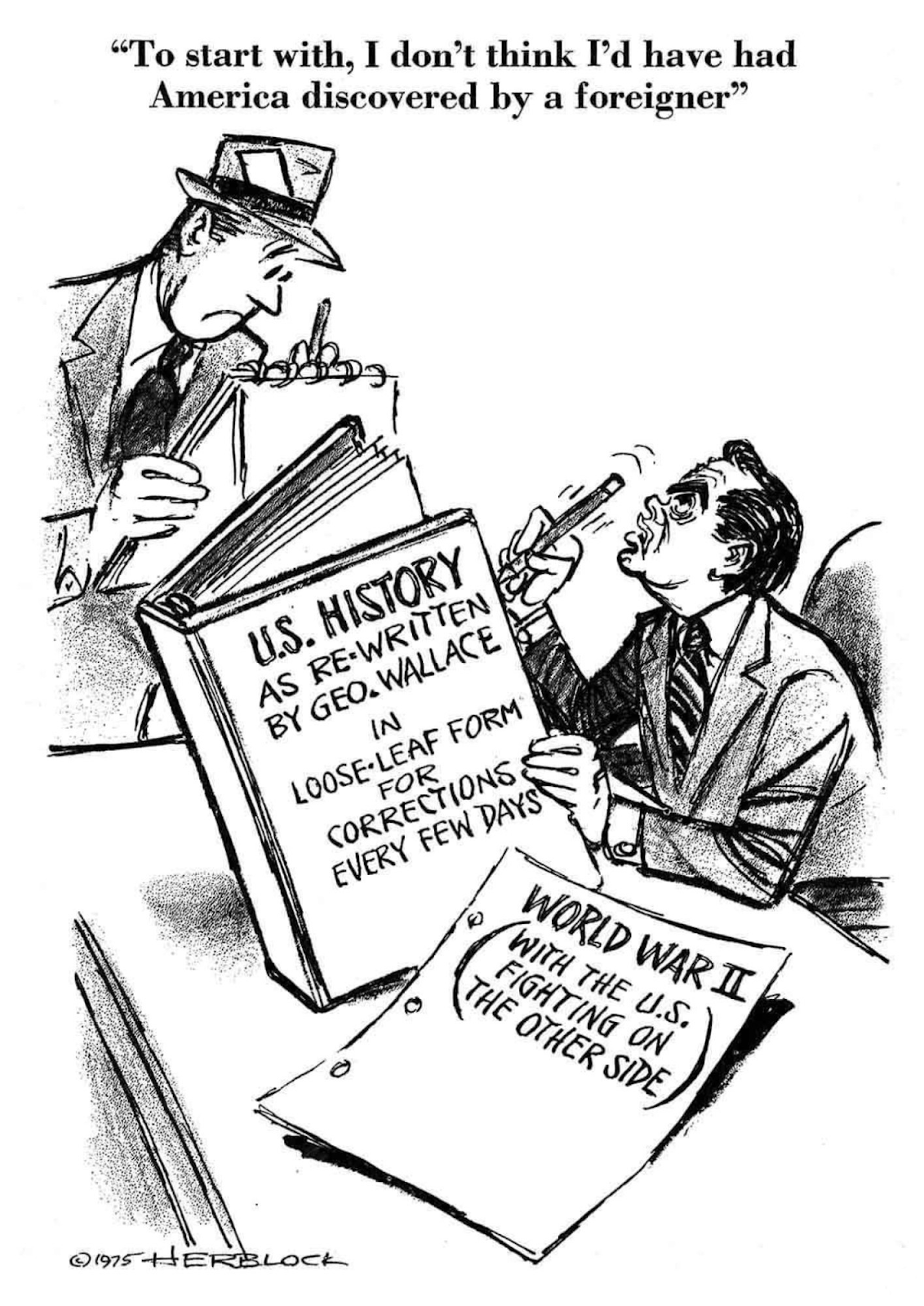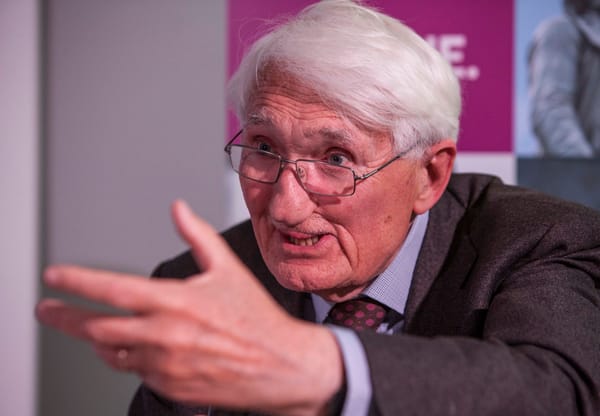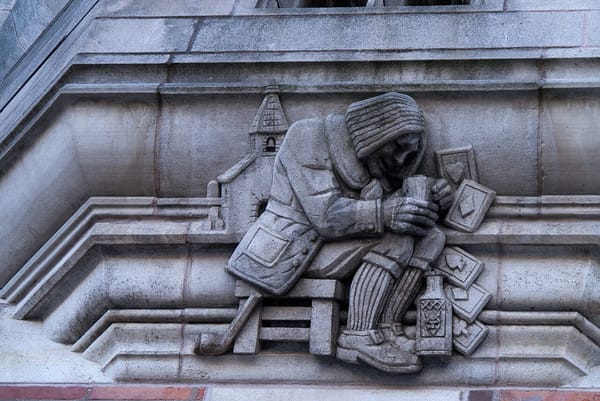Hitler’s Shadow, Trump’s Shield
How calling Trump the “N-word” sparked the free speech RICO.

The American political right has long had a strange relationship with the idea of free speech. For many conservatives, “free speech” does not mean the principle of a public square where all ideas can be expressed and contested. Rather, it is understood as a shield against social consequence—the freedom to say what they want, no matter how malignant, bigoted, or corrosive, without being exiled, shamed, or made into a pariah.
In many ways, this view is rooted in a form of group narcissism: the belief that one is entitled to friendship, acceptance, and social belonging no matter how badly they’ve treated the very groups choosing to cut ties. For conservatives, this social penalty is seen as the ultimate violation of free speech, producing a deep sense of betrayal and injustice.
From this belief has emerged a recurring grievance—the idea of “reverse racism” or “reverse hate speech.” In practice, it works like this: if I direct racist abuse at you, and you name that racism for what it is, and I then face a social penalty for it, I claim that your act of holding me accountable is a form of discrimination against me.
It makes little sense, but the belief runs so deep that conservatives have been willing to crowdfund hundreds of thousands of dollars to support individuals punished for such conduct—such as the case of Shiloh Hendrix, who raised nearly one million dollars after she was captured on video accosting a Black five-year-old boy and calling him the n-word. When she later released a statement saying she was in “a very dire situation” because of the incident, her defenders claimed this constituted a violation of her free speech.
That inversion of the concept has shaped the right’s rhetoric for decades. But in the wake of Charlie Kirk’s assassination, America has reached a turning point. According to the President of the United States, comparing “wonderful Americans like Charlie to Nazis… is directly responsible for the terrorism we’re seeing in our country.”
This accusation, voiced by the president, was echoed by his second in command, who accused half the country of being accomplices to Kirk’s murder, posthumously:
Donors, activists, journalist, social media influencers, and politicians… emphasizing not Charlie [Kirk’s] innocence but the fact that he said things some didn’t like… are creating an environment where things like this are inevitably going to happen.
Using these baseless claims as justification, the Attorney General of the United States announced a government-orchestrated crackdown on so-called hate speech:
There’s free speech and then there’s hate speech, and there is no place—especially now, especially after what happened to Charlie—in our society. We will absolutely target you, go after you, if you are targeting anyone with hate speech.
The administration is now arguing that words themselves—specifically comparisons to Nazis and Hitler—are responsible for violence. And yet, in much of the mainstream coverage of this crackdown, as in the mainstream eulogies of the late Charlie Kirk, the very words at the heart of the controversy have been erased from the record.
It is as if—“slowly, then all at once”—the press has accepted the president’s claim that comparing someone to a Nazi or to Hitler constitutes an act of terrorism, prosecutable under RICO. The result is a dangerous distortion: the government is using the language of free speech to justify narrowing it, while the press, through silence, is helping obscure the words at the center of the conflict.
The role of the media
James Madison, “Father of the Constitution,” argued that “public opinion sets bounds to every government, and is the real sovereign in every free one.” The word choices made by the media inevitably play a role in shaping public opinion around current events. What I saw in the wake of this “shock and awe” onslaught against Americans’ free speech was notable publications, covering the government’s crackdown, editing themselves to ensure their coverage of the story didn’t upset the president.
The New York Times published an article with 4 contributors—Trump Invokes Kirk’s Killing in Justifying Measures to Silence Opponents—and not one of them mentioned the words Nazi or Hitler. Likewise, The Washington Post published an article with multiple contributors–Trump, allies seek to punish speech they dislike following Kirk killing—and the one word that evoked Trump’s ire, and inspired the government crackdown, was noticeably absent from the coverage.
“Free D.C., free Palestine, Trump is the Hitler of our time.”
We as Americans have never seen anything quite like Donald Trump. We’ve read about him in history, but to actually be living under the rule of a real, live tyrant—who has converted the federal government into a vengeance-seeking “mob in the hands of a single madman”—is pretty fucking scary. Everyone, from the CEOs of Fortune 500 companies to their underpaid and underinsured employees, is afraid of what may happen if they run afoul of the president, or if they improperly mourn his deceased “friend.”
We saw this play out in real time, as business leaders rushed to fire reporters and writers, while the FCC pressured networks to pull syndicated programming—all to ensure they did not anger the president, who is actively weaponizing the military, law enforcement, and the federal government against anyone he calls “the enemy within,” a catchphrase applied to any group or person not considered a “friend.”
Unlike the other pieces I reviewed, which spoke about the issue in ambiguous terms, Anthony Fisher, Senior Editor at MSNBC Daily, was much more direct. Where I absolutely agree with him is this: it’s going to take a great deal of courage to face the existential crisis brought about by the current administration. That courage begins with writers insisting that their words be captured in a way that does not obscure reality. We all have to be united in speaking truth to power.
It was President Garfield who said, “A brave man [or woman] is a man [or woman] who dares to look the Devil in the face and tell him he is a devil.”
And it was President Roosevelt who reminded us:
To announce that there must be no criticism of the President, or that we are to stand by the President, right or wrong, is not only unpatriotic and servile, but is morally treasonable to the American public. Nothing but the truth should be spoken about him or anyone else. But it is even more important to tell the truth, pleasant or unpleasant, about him than about anyone else.
The role of the media in a free society is to tell the people the truth. If we can no longer do that, then we are no longer a free society. We must speak the truth about Trump, no matter how unpleasant the comparisons may be—because doing so is the only way to ensure that we will continue to live free.
The case for clarity
It is vital for writers and journalists to name the contested language at the center of Trump’s crackdown. Remember, this all began when three brave women organized a demonstration at a restaurant in D.C., where they loudly declared, within a few feet of the President’s face: “Free D.C., Free Palestine, Trump is the Hitler of our time.”
What we learn from the State’s response is that the one association Trump despises—perhaps even more than Epstein—is his association with Hitler. And we should never let conservatives forget that this association originated on the right itself.
When we revisit the words of the founding generation, and the emphasis they placed on rejecting government censorship, we as writers have a duty to protect protected speech at all costs:
Freedom of speech is a principal pillar of a free government; when this support is taken away, the constitution of a free society is dissolved, and tyranny is erected on its ruins… An evil magistrate intrusted with power to punish for words, would be armed with a weapon the most destructive and terrible. Under pretence of pruning off the exuberant branches, he would be apt to destroy the tree.
—Benjamin Franklin
Franklin’s warning makes our obligation clear: to say, loudly and plainly, that Trump is using the death of Charlie Kirk in almost the same way Hitler used the Reichstag fire. His chief of staff, Stephen Miller, appears to be using Kirk in the same myth-making way Joseph Goebbels used Horst Wessel. That must remain fair ground for public discussion. If we can no longer state the obvious or draw clear parallels because it is impolite or might upset the ruler, we are aiding the wanton destruction of Franklin’s proverbial tree.
If we don’t free ourselves from the paradox of politeness, we risk creating a society so tolerant of intolerance that it becomes impolite to call Nazis what they are. This administration has already communicated to the public that any effort to enforce transparency or question their official narrative will be treated as a hostile act by the president.
As writers and journalists, we have a responsibility to offer a counter-narrative to the lies being spun for power—a narrative rooted in truth. It is not false to say that the intellectuals enabling this government conceive of themselves as the confederate side of the Civil War. It is not false to say the vice president used the occasion of Charlie Kirk’s death to launch a broadside against “the left,” and that this administration has signaled an intent to undertake a rapid and penetrating purge (De-Ba'athification) of liberal institutions and the Democratic Party.
All of this is true, and yet the administration is working to prevent us from saying so: encouraging online doxing mobs to report fellow citizens to their employers, threatening imprisonment or offshore detention for Americans who oppose fascism, and otherwise criminalizing dissent.

Although it is once again en vogue, in certain quarters, to relitigate global and local lost causes, I reject the premise advanced by the Vice President: that merely discussing Trump’s drive for Caesarean power—and comparing his actions to those of Adolf Hitler in the final days of the Weimar Republic—is attempted murder. Yet this is precisely what the President has implied, by implicating half the country in his trumped-up free speech RICO.
In a free country, with free elections, public opinion is shaped through free speech. We facilitate the transfer of power through the transfer of ideas. The very claim that certain thoughts in a deregulated marketplace of ideas pose a threat to those in power is either an admission that the comparisons to Hitler have merit—or a declaration that any ideas questioning their legitimacy, including the Constitution itself, will be censored.
By far, the Trump administration is the most anti-American administration we have witnessed since the Constitution was expanded in the wake of the Civil War. Their unceasing attack on civil liberties is all the evidence required to validate this claim. In Trump’s De-Ba’athified America, current events crash like waves against the shore—by the time one calamity is chronicled, another follows, leaving our conclusions dangling in ellipses rather than closing with the once-cherished period.
Days after the retaliation against Jimmy Kimmel, it is Stephen Colbert’s farewell which rings with both heartbreak and clarity:
Sometimes the only way to truly know how much you love something might be losing it… My friends, I have never loved my country more desperately.
Colbert’s words ring painfully true as we fight to preserve our democracy, and they call to mind the farewell address of our nation’s first president:
It is of infinite moment that you should properly estimate the immense value of your national Union… accustoming yourselves to think and speak of it as the palladium of your political safety and prosperity.
The alternate domination of one faction over another, sharpened by the spirit of revenge natural to party dissension, which in different ages and countries has perpetrated the most horrid enormities, is itself a frightful despotism. But this leads at length to a more formal and permanent despotism… sooner or later the chief of some prevailing faction, more able or more fortunate than his competitors, turns this disposition to the purposes of his own elevation, on the ruins of public liberty.
My friends, not only are we living in Hitler’s America—where the federal government is censoring the N-word (Nazi) to stop us all from saying it—we are also living in George Washington’s nightmare. If we, as writers, continue to concede the terms of discussion and frame the conflict around the master narrative dictated by the White House, then we are authoring the opening lines of the end of our liberty.
Featured image is Jimmy Kimmel, from the Biden White House Archives




